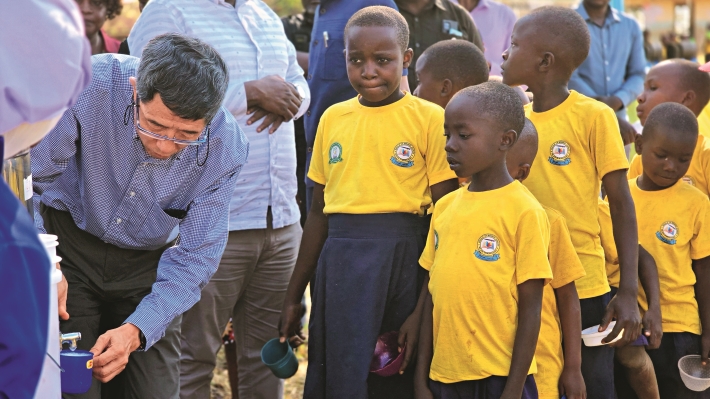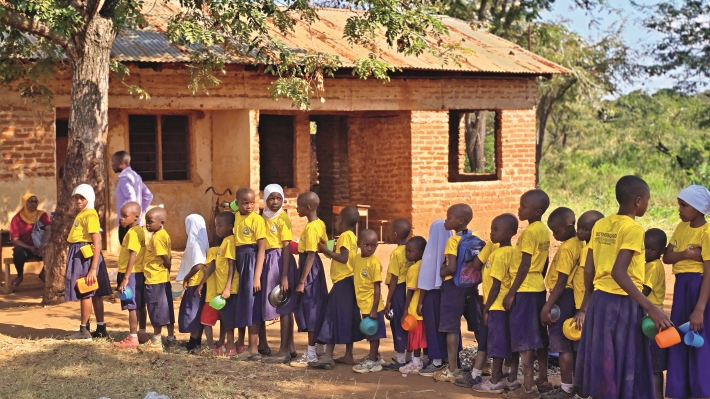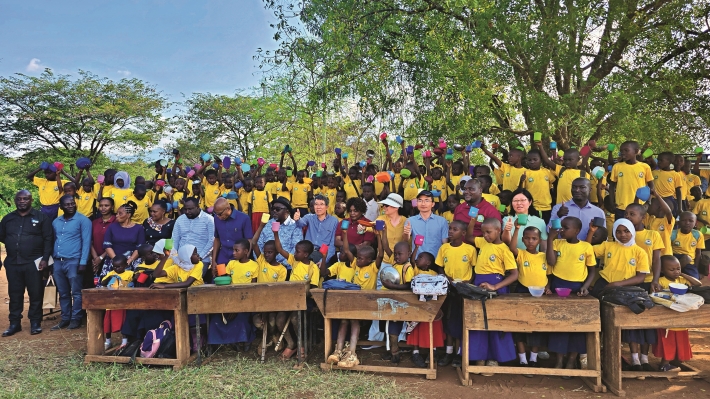|
||||||||||
| Home Top News Economy/Tech Culture/Sports China in Foreign Eyes Green Development Videos Intangible Cultural Heritages |
|
||||||||||
| Home Top News Economy/Tech Culture/Sports China in Foreign Eyes Green Development Videos Intangible Cultural Heritages |
| ChinAfrica |
| Let the Children Thrive |
| China-Tanzania partnership launches first free soy milk school programme to boost education and improve rural livelihoods |
| Li Xiaoyu | VOL. 17 September 2025 ·2025-09-02 |

Li Xiaoyun, lead chair professor at CAU, distributes daily soy milk to students at Juhudi Primary School (COURTESY)
As the sun rises over Mtego wa Simba, a quiet village nestled in the heart of Tanzania’s Morogoro Region, the aroma of sizzling mandazi, a deep-fried dough snack popular in East African countries, floats through the school compound. At Juhudi Primary School, the air is filled with cheerful voices as children eagerly line up for a warm, unfamiliar treat - a steaming cup of soy milk.
For the school’s 350 students, this ordinary beverage marks the beginning of something extraordinary. Gone are the days when the children had to attend school on an empty stomach. Thanks to a new nutrition programme jointly launched by China Agricultural University (CAU) and local Tanzanian authorities, each student will receive a free daily serving of soy milk and snacks for three years. The aim is clear: to combat hunger, improve classroom focus, and open new doors for rural development - one cup at a time.

School students line up to receive their soy milk at Juhudi Primary School (COURTESY)
Smart nutrition, simple solution
This programme marks a new phase in the broader “Small Beans, Big Nutrition” initiative, which seeks to address food insecurity while strengthening local agricultural value chains.
During the official launch on 14 July, Morogoro Regional Commissioner Adam Malima applauded the programme’s creative strategy to tackle both educational and nutritional challenges. “Lack of proper nutrition among schoolchildren is a major cause of poor concentration and low academic performance,” he said, noting that this soy milk initiative could lower dropout rates and boost student performance by ensuring consistent access to healthy meals during the school day.
The commissioner also pledged a personal contribution of 1 million Tanzanian shillings ($389) to support the programme’s initial phase, and urged others to support its expansion. He called on the Morogoro District Council to transform Mtego wa Simba Village into a key hub for soybean farming to secure a stable supply of raw ingredients.
Li Xiaoyun, lead chair professor at CAU, stressed that the soy milk programme is more than a school feeding initiative - it is part of a broader, long-term effort to promote food security, improve rural livelihoods, and create a resilient local food system. “We are grateful to the Tanzanian government and local farmers for their commitment. Through low-cost innovations tailored to local needs, we can improve nutrition while supporting smallholder farmers,” Li said.

The China-Tanzania School Soy Milk Nutrition Programme is officially launched on 14 July, making Juhudi Primary School the first in Tanzania to offer free soy milk to all enrolled students (COURTESY)
Small beans, big impact
The origins of this programme date back to 2011, when Li and his team first began poverty alleviation work in Morogoro Region. Their early efforts focused on an intensive maize cultivation model known as “Small Technology, Big Harvest,” which helped farmers to raise crop output through simple, labour-intensive methods. Later, in 2021, the team began promoting intercropping techniques that combined maize with nitrogen-fixing soybeans, an innovation that not only improved soil fertility, but also diversified farm output.
By 2022, CAU had expanded its work to include training in soybean processing, including the production of soy milk and related products. The team collaborated with local residents to set up demonstration plots and small-scale production units, laying the groundwork for the current school-based nutrition programme.
The idea of soy milk as a multi-purpose solution became more popular through local pioneers like Omary Jayo, a retired electrical technician turned village entrepreneur in Mtego wa Simba. Inspired by CAU’s training, Jayo began selling soy milk in his village in 2023. Starting with just two cups a day, his business has grown steadily, now selling over 20 cups each morning. A cup of soy milk is priced at 500 Tanzanian shillings ($0.19). By blending soybeans with native spices and a bit of sugar, Jayo crafted a distinctly Tanzanian beverage that villagers now affectionately call “the Chinese drink.”
Jayo’s success illustrates the “triple benefit” vision Li hopes to achieve: enhancing nutrition, improving soil health through soybean cultivation, and extending the agricultural value chain to generate income. “It’s a cost-effective intervention with wide-reaching benefits,” Li explained. “Soy milk is protein-rich and helps to balance a maize-heavy diet, which lacks key amino acids like lysine and tryptophan.”
The journey hasn’t been without challenges. Local farmers initially struggled with more complex intercropping techniques, but many have adapted by modifying methods to fit local conditions, such as using relay or rotational planting. CAU supported these innovations by providing soybean seeds, upgrading soy milk processing facilities, and renovating the village government office to handle programme logistics.
Assistant Regional Administrative Secretary Rozalia Grayson Rwegasira highlighted the project’s evolution, noting that CAU’s efforts have expanded from Peapea village to Mtego wa Simba, Kitete and Makuyu villages. Farmers in these areas have produced 12 tonnes of soybeans and 20 tonnes of maize, turning initial experiments into lasting change.
As soy milk is served each school day at Juhudi Primary School, the initiative stands as a powerful example of what can be accomplished when grassroots entrepreneurship, academic guidance, and public-sector backing converge. What started as a technical farming project has evolved into a far-reaching nutrition and development model.
| About Us | Contact Us | Advertise with Us | Subscribe |
| Copyright Beijing Review All rights reserved 京ICP备08005356号-5 京公网安备110102005860号 |